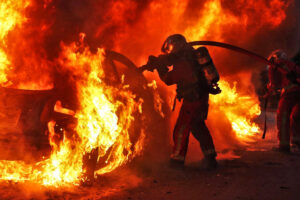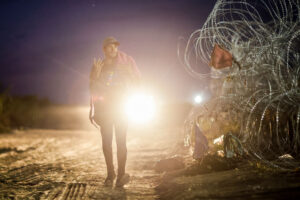Ouassila Kessaci, 57, will never forget the agonising wait to confirm the death of her eldest son. On 29 December 2020, 22-year-old Brahim left the apartment saying he would be back — but the next day, Kessaci received a panicked call from Brahim’s wife, who believed Brahim was dead. “It really shocked me,” recalls Kessaci. “She shook me up.”
Over the next four days, Kessaci frantically called the police until they finally identified her son. He’d been murdered, and his body had been burned inside a car just off the main highway north of Marseille. He, along with two of his friends, had been victims of what the French police coldly call a règlement de comptes — literally a “settling of scores” — in the drug trade. Kessaci acknowledges her son was “in with a bad crowd”, but insists he wasn’t the primary target.
Kessaci is not the only mother to lose a son to Marseille’s underworld. Last year, Marseille hit an annual record with at least 49 murders linked to the drug trade, more than double the 2020 figure. The age of both the murderers and their victims is falling; teenagers are killing teenagers.
The local police and chief prosecutor vow to keep arresting and prosecuting dealers. And this month, a new police prefect is taking over the département, charged with tackling what the interior ministry calls “narco-banditry”. But the numbers don’t lie: existing laws and police practices are failing to deliver lasting peace and security. What’s happening in Marseille is a tragedy — but it is also ground zero for France’s failed war on drugs.
For many, Marseille still evokes the “French Connection”, the decades-long arrangement by which Corsican mobsters smuggled heroin from Southeast Asia and Turkey to North America, immortalised in the 1971 film. In those days, France’s port city played a leading role in the international drug trade. But those trafficking networks were dismantled 50 years ago. While the city is seeing rising shares of cocaine, Marseille’s drug market today is dominated by a far more benign substance: cannabis — typically smoked as hashish and referred to in French as “shit”. And despite all the bloodshed, the stock bought and sold here is largely meant for local consumption. “Marseille isn’t a ‘hub’ for cannabis in France or Europe,” Claire Duport, a sociologist and researcher covering the region for the French Observatory of Drugs and Addictive Trends (OFDT), told me. “The cannabis sold in Lille, Paris, Bordeaux, Berlin, or London isn’t coming from Marseille.”
Yet drug distribution in Marseille is highly unusual. Much of the trade here takes place out in the open, swallowing up precious common space in scores of housing projects. According to the most recent police count, there are roughly 127 “points of sale”, many scattered about the quartiers nords, or “northern neighbourhoods”. In pockets of the city long plagued by unemployment and a lack of basic public services, drug dealing has filled a void.
“This business helps thousands of people live,” says Eddy Sid, a local spokesperson for France’s top police union, Unité SGP Police-Force Ouvrière. “All it takes is approaching someone who’s struggling and saying, ‘Would you like to become a nanny?’ I’m going to store this here. You pay €800 a month in rent? I’ll give you double that every month. In exchange, I’m going to keep my product in your kitchen or in the closet, and when they need to, my vendors are going to come and get it. People are benefiting from social misery and that’s how it gets ingrained.”
In one notoriously dilapidated housing project in Marseille’s northern 13th arrondissement, I saw the familiar graffiti of the business: arrows pointing consumers toward the sale point and a list of the products on offer: chit (hashish), coke, and la frappe — a term to advertise supposedly stronger hashish, often featuring higher levels of THC. Around here, sales networks tend to follow the same basic structure. On the front lines are young lookouts known as the chouf, a word that comes from the Arabic verb “to watch”. Often in their early teens, the chouf’s job is to yell if they see police. Sometimes, they also place physical barriers such as garbage dumpsters to deter or hinder law enforcement. Then, there are the charbonneurs, with physical access to the stock. The higher-level operatives in touch with suppliers stay out of the spotlight.
But in parts of the city, business has become unstable. According to Philippe Pujol, a Marseille native and author of a prize-winning book on the subject, La Fabrique du monstre, the local drug trade is undergoing a form of “uberisation”, with various groups fighting over small slivers of the market. Over the span of a decade, from around 2010 to 2020, the drug lords of old gave way to a more decentralised distribution system, which has triggered the recent eruption of violence.
“The revenge killings are an indicator of competition,” Pujol told me at a café downtown. “And it’s not about taking control of the hierarchy [of organisations], but it’s about taking over terrain. These are small-scale actors taking small pieces of land. And there’s another paradox: the more powerful you are, the less violence is necessary. The weaker you are, the more you need to show your force.”
The situation has deteriorated since the Covid lockdowns of 2020. Social media platforms such as Telegram, Snapchat, and TikTok now play a prominent role in recruiting teens from outside Marseille to take up jobs in the business, with advertisements vaunting sunshine and steady pay. And in a particularly gruesome trend highlighted by the police last year, some groups are even documenting and boasting about deadly violence on social media.
Meanwhile, the press and law enforcement have become fixated on a single conflict between two rival gangs, Yoda and DZ Mafia, which the police prefecture deems responsible for 80% of the drug-related killings in 2023. But Pujol argues that the narrative of an alleged “cartel war” between two juggernauts is misleading: the ill-defined groups are far from dominating the market. And Marseille’s drug trade is hardly sophisticated enough to be termed a “cartel”. “The Mexican cartels are producing drugs,” Pujol says. “We’re not producing drugs here. Here, we’re selling retail in the street. It’s shitty. There’s nothing worse. The people making money are the ones who produce and sell.”
As the situation worsens, the authorities celebrate their small victories: namely, arrests of low-level dealers and sustained interventions in housing projects that have resulted in a decline in the official count of points of sale. Police regularly invite the press to document these success stories: last month, for instance, they applauded the clearing out of La Paternelle, a housing project at the heart of the war between Yoda and DZ Mafia. But this is just a drop in the ocean. When I ask Sid if the current police strategy is working, he tells me that law enforcement officials need more resources. Though 450 new cops have arrived in the département over the last three years, Sid says they need 300 more in Marseille.
There is an emerging chorus in Marseille, though, calling for a different course of action. Fed up with people killing each other over a widely available substance, they believe France should consider following other countries down the path of cannabis decriminalisation and legalisation. One such advocate is Katia Yakoubi, a social worker and resident of the northern 14th arrondissement. “We’re not saying it’s a magic solution, but we believe it’s necessary to dry up trafficking,” she told me. She pointed to the other countries abandoning repressive policies: Portugal, Spain, and even Italy have decriminalised the use and possession of cannabis in small amounts, and Germany’s Bundestag is expected to legalise cannabis possession and cultivation this month.
Amine Kessaci, Brahim’s brother and the founder of the anti-drug violence group Conscience, is another proponent of legalisation, arguing that it would draw customers away from the illegal networks and formalise jobs that already exist. “These repressive policies aren’t working,” he says. “Enough is enough, it’s been 25 years. How many more people need to die? We can’t keep counting the dead every year and keep following the same logic.”
Sébastien Delogu, an MP representing a district of northern Marseille with Left-populist party La France Insoumise, isn’t fully sold on legalisation — but he does call for “de-penalisation”. “Rather than police wasting millions of hours and millions of euros trying to find a little block of hash, they could find the heads of networks,” he says. “For over 30 years, you see the same shock-and-awe tactics from the police — and nothing has changed.”
There has, however, been some progress on this front in Paris. In 2021, a commission in the National Assembly called for a state-regulated legalisation of cannabis. And last year, a prominent state body charged with consulting lawmakers — the Economic, Social, and Environmental Council (CESE) — called for a “regulated legalisation”. But the political winds continue to blow in the opposite direction. Though Emmanuel Macron called for decriminalisation during his 2017 presidential campaign, he has since abandoned it amid a broader shift to the Right. He now backs a zero-tolerance policy, personified by his hardline interior minister Gérald Darmanin. “It’s a lack of political courage,” Delogu says. “He’s not working for the general interest, but rather trying to appeal to his electorate.”
A major shift in policy appears unlikely today. But if France eventually does follow the rest of Europe in adopting less repressive drug policies, it seems inevitable that Marseille will play a leading role. Teeming with activist groups and various neighbourhood associations, it’s a city known for its autonomous spirit and willingness to defy the capital. Besides, the typical chest-thumping and fear-mongering from drug warriors can only go so far here — in Marseille, residents have actually experienced the terrible scourge of drug violence first-hand. That’s precisely why more and more of them think it’s time to try something new.
Disclaimer
Some of the posts we share are controversial and we do not necessarily agree with them in the whole extend. Sometimes we agree with the content or part of it but we do not agree with the narration or language. Nevertheless we find them somehow interesting, valuable and/or informative or we share them, because we strongly believe in freedom of speech, free press and journalism. We strongly encourage you to have a critical approach to all the content, do your own research and analysis to build your own opinion.
We would be glad to have your feedback.
Source: UnHerd Read the original article here: https://unherd.com/




